Annette Lyon's Blog, page 10
July 29, 2013
Blog Hop's Over!
Thanks so much to everyone who participated in the Summer Splash blog hop!
Winners from my blog and all the others, including the grand prize winners, will be notified soon!© 2012 Annette Lyon, all rights reserved
Winners from my blog and all the others, including the grand prize winners, will be notified soon!© 2012 Annette Lyon, all rights reserved
Published on July 29, 2013 21:24
July 25, 2013
Blog Hop: Win Books & Other Prizes!
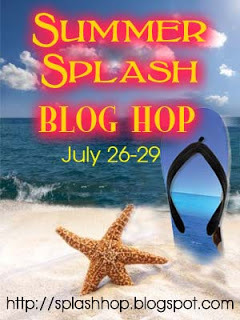
From Friday, July 26 thru Monday, July 29, I'm part of a giant blog hop extravaganza, where you can hop around from the main Summer Splash Blog Hop site to enter to win a ton of awesome prizes, including e-books, paper books, Kindles, and much more! It begins and ends at midnight on those dates (EDT), so don't miss out.
**WIN BIG TWO WAYS**
1) Visit every blog included in the hop, and you'll be entered into win one of 3 prizes, including big bundles of e-books and signed paperbacks. (2 copies of my grammar book will be awarded as part of the prizes!)
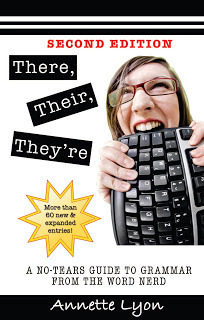
2) Spread the word about the hop on Twitter, using the hash tag #splashwithus for a chance to win one of these awesome prizes:
Kindle Fire HD 8.9 (The one worth $269.00!)
$100 Amazon gift card
$50 Amazon gift card
***WIN HERE ON MY BLOG!***

You have 2 ways to win a copy of my soon-to-be-released contemporary romance, A Portrait for Toni. I'll choose 2 winners at random who do either of the following (or do both of the following for 2 chances to win!)
Win a Copy of Toni, Option 1
Visit the review I wrote for my grammar book on GoodReads (FIND IT HERE) then EMAIL ME the answer to the following question. Send the answer to annette (at) annettelyon (dot) com
The question: After reading my grammar book, how many points did my son's ACT English score go up the next time he took the test?
DO NOT leave the answer in the comments! This post will be on moderation, so if you comment with the answer, your comment will be deleted, and it won't count as an entry.
Win a Copy of Toni, Option 2
Leave a comment on this post listing a grammar, usage, or punctuation rule that's either a pet peeve of yours or something you always have to check to not mess up.
(Remember, comment moderation will be on, so if your comment doesn't show up right away, don't sweat it. It WILL show up soon!)
That's it! TWO ways to win a copy of A Portrait for Toni here on my blog, and lots of chances to tweet and otherwise participate in the hop to win lots of other prizes. Some of the blogs have some really fun contests and activities; be sure to check them out!
© 2012 Annette Lyon, all rights reserved
Published on July 25, 2013 20:00
July 15, 2013
On Beauty, Dove, and the Lies Society Tells About Women
I'm getting all soap-boxy today. It's about a topic I've been thinking about for months, and it's finally come to a head.
You've all seen the Dove Real Beauty commercial, right? The one with the forensic artist? If not, here it is. Or watch it again to refresh your memory:
Many women's reaction to the video was powerful emotion. Some women cried at the message, which is captured in the tag line: "You're more beautiful than you think." Yes, I am, was the overwhelming response as thousands of women shared the video through social media.
Then came the backlash about whether the forensic artist was biased because he knew about the experiment, and how the majority of the women were Caucasian, and maybe that's the kind of beauty we're being told is somehow "real." Those arguments may or may not be valid.
It was a different response that make me sit up and pay attention: the one saying that outward appearance/beauty shouldn't be what society looks at anyway, and that making a commercial that focuses on it is wrong.
I even saw well-intentioned men get on the same high horse. They did mean well. I get that. Society is too focused on beauty. Isn't that the point? The truth is, we live in a society that does put an extraordinary amount of emphasis and significance to outward appearance. That is a fact.
Another fact: Women are often way too hard on themselves because they can never measure up to the airbrushed models and movie stars bombarding them every day.
I know I'm only one among millions of girls who grew up with a gorgeous mother who was convinced she wasn't good enough in whatever way (too fat or whatever else). I've tried hard not to pass on those kinds of ideas to my daughters, but ironically, discovered that I have, at least with one of my features, and one of my daughters now worries about that very same feature, even though she's totally gorgeous.
Dangit.
Dove took a new angle on the beauty war. Instead of using those images of impossible beauty, where the models themselves don't even look like that, they used everyday women and showed the beauty they have.
To me, it was refreshing to see a company essentially back up the trolley and give women a dose of positivity. Should beauty be the only thing we're concerned about? Of course not. But it'll take a huge paradigm shift, and likely generations, before we move past it. If we ever do.
To any man claiming he gets it, or that he somehow values all women equally, no matter what they look like, I say, hah. Even women don't/can't always look past the outer shell, and we're the targets of the issue every minute of every day. It's not a man problem. It's a societal problem.
Case in point: One of the men I saw who was up in arms about this commercial and its focus on beauty (rather than brains, or other qualities, it was implied) had previously referred to his wife on Facebook and elsewhere as his hot and gorgeous wife. For that matter, pretty much any time I saw him refer to her, the word wife was preceded by a word or phrase describing her physical beauty. And I'm sure he did so out of love.
But after a lengthy discussion on a thread about this commercial, and my (always vocal, sometimes obnoxious) opinions on how our society values appearance so much, I noticed a change. I have no idea if it was intentional, but suddenly this same good man started referring to his spouse as his smart, brilliant, and talented wife.
If we think it's wrong that Dove made a commercial about beauty, then we should be ticked off at every women's magazine cover, every makeup commercial, every movie.
The problem is so widespread that not too long ago, one of my writing idols admitted in a blog post that if she could take a pill to be prettier but stupid, she's take it. I was horrified, in part because she's so stinking smart (and she's already pretty anyway, yet apparently doesn't think so), but also because she was pandering to the lowest common denominator in society. Not even this brilliant woman of letters was exempt.
(I was also dismayed because I'd lived the stupid/pretty pill thing in the form of medication side effects that made me lose a bunch of weight but made me dumb as a rock, and I was absolutely miserable the entire time.)
So men: Do you think you get what it's like being a woman, or that appearance isn't that big a deal? Read this post about sexual harassment at a science fiction/fantasy convention and think again. Women, it's an important read for us, too.
Even better, watch this video with Dustin Hoffman. Years ago, I'd heard about the epiphany he had playing a woman in Tootsie, but I'd never seen this video where he describes it. This clip has been making the rounds on Facebook lately, so you may have already come across it, because I didn't get to putting up this post early enough.
If you've seen it, watch it anyway. If you haven't, watch it now, and then watch it again.
I dare you to think about women and beauty, society, appearance, and intellect, in the same way.
(I always knew there was a reason I admired Dustin Hoffman . . .)© 2012 Annette Lyon, all rights reserved
You've all seen the Dove Real Beauty commercial, right? The one with the forensic artist? If not, here it is. Or watch it again to refresh your memory:
Many women's reaction to the video was powerful emotion. Some women cried at the message, which is captured in the tag line: "You're more beautiful than you think." Yes, I am, was the overwhelming response as thousands of women shared the video through social media.
Then came the backlash about whether the forensic artist was biased because he knew about the experiment, and how the majority of the women were Caucasian, and maybe that's the kind of beauty we're being told is somehow "real." Those arguments may or may not be valid.
It was a different response that make me sit up and pay attention: the one saying that outward appearance/beauty shouldn't be what society looks at anyway, and that making a commercial that focuses on it is wrong.
I even saw well-intentioned men get on the same high horse. They did mean well. I get that. Society is too focused on beauty. Isn't that the point? The truth is, we live in a society that does put an extraordinary amount of emphasis and significance to outward appearance. That is a fact.
Another fact: Women are often way too hard on themselves because they can never measure up to the airbrushed models and movie stars bombarding them every day.
I know I'm only one among millions of girls who grew up with a gorgeous mother who was convinced she wasn't good enough in whatever way (too fat or whatever else). I've tried hard not to pass on those kinds of ideas to my daughters, but ironically, discovered that I have, at least with one of my features, and one of my daughters now worries about that very same feature, even though she's totally gorgeous.
Dangit.
Dove took a new angle on the beauty war. Instead of using those images of impossible beauty, where the models themselves don't even look like that, they used everyday women and showed the beauty they have.
To me, it was refreshing to see a company essentially back up the trolley and give women a dose of positivity. Should beauty be the only thing we're concerned about? Of course not. But it'll take a huge paradigm shift, and likely generations, before we move past it. If we ever do.
To any man claiming he gets it, or that he somehow values all women equally, no matter what they look like, I say, hah. Even women don't/can't always look past the outer shell, and we're the targets of the issue every minute of every day. It's not a man problem. It's a societal problem.
Case in point: One of the men I saw who was up in arms about this commercial and its focus on beauty (rather than brains, or other qualities, it was implied) had previously referred to his wife on Facebook and elsewhere as his hot and gorgeous wife. For that matter, pretty much any time I saw him refer to her, the word wife was preceded by a word or phrase describing her physical beauty. And I'm sure he did so out of love.
But after a lengthy discussion on a thread about this commercial, and my (always vocal, sometimes obnoxious) opinions on how our society values appearance so much, I noticed a change. I have no idea if it was intentional, but suddenly this same good man started referring to his spouse as his smart, brilliant, and talented wife.
If we think it's wrong that Dove made a commercial about beauty, then we should be ticked off at every women's magazine cover, every makeup commercial, every movie.
The problem is so widespread that not too long ago, one of my writing idols admitted in a blog post that if she could take a pill to be prettier but stupid, she's take it. I was horrified, in part because she's so stinking smart (and she's already pretty anyway, yet apparently doesn't think so), but also because she was pandering to the lowest common denominator in society. Not even this brilliant woman of letters was exempt.
(I was also dismayed because I'd lived the stupid/pretty pill thing in the form of medication side effects that made me lose a bunch of weight but made me dumb as a rock, and I was absolutely miserable the entire time.)
So men: Do you think you get what it's like being a woman, or that appearance isn't that big a deal? Read this post about sexual harassment at a science fiction/fantasy convention and think again. Women, it's an important read for us, too.
Even better, watch this video with Dustin Hoffman. Years ago, I'd heard about the epiphany he had playing a woman in Tootsie, but I'd never seen this video where he describes it. This clip has been making the rounds on Facebook lately, so you may have already come across it, because I didn't get to putting up this post early enough.
If you've seen it, watch it anyway. If you haven't, watch it now, and then watch it again.
I dare you to think about women and beauty, society, appearance, and intellect, in the same way.
(I always knew there was a reason I admired Dustin Hoffman . . .)© 2012 Annette Lyon, all rights reserved
Published on July 15, 2013 07:00
June 12, 2013
WNW: Please Trash?
Last winter, our family took a trip to the Happiest Place on Earth. Because I'm a nerd and can't entirely shut off my editor brain even on vacation, I couldn't help but notice a recurring grammatical problem on the trash cans in Disneyland and California Adventure.
While I took plenty of pictures of the kids, I found myself snapping pictures of trash cans and other things that made me laugh. Soon my husband was in on it too. (My sickness appears to be contagious.)
Let's take a look.
The folks designing the cans for recyclables did an okay job. Note this can, with the polite request to recycle:
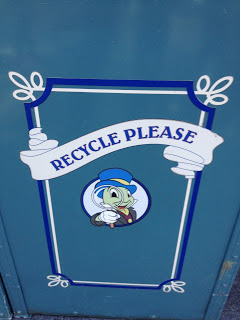
We could argue that they could have added a comma between the two words, making it RECYCLE, PLEASE, but at least the request makes sense.
The receptacle standing right next to this one, however, uses the same type of phrase, including please, but they ended up with an unintentional humorous meaning:
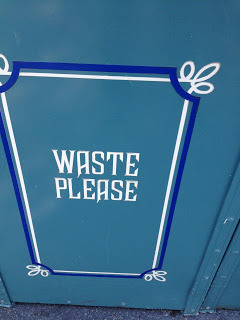
Now obviously they don't want park goers to throw things around and otherwise waste stuff. No, what they're asking is for people to put their waste in the can. But that's not necessarily what the can says. Because waste can be both a verb (don't waste your money) and a noun (garbage = waste), the two-word phrase could mean either, "Please put your waste here," or, "Please do waste the park."
The problem was compounded by the fact that its twin, the RECYCLE PLEASE can, used a verb first, making it all too easy to assume that the other can also has a verb in its almost-matching phrase. Look at the cans side by side, and you'll see what I mean.
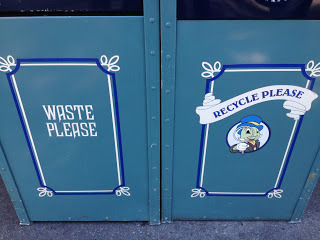
Jiminy Cricket wasn't the only one with the problem. We found the very same issue in Frontier Land.
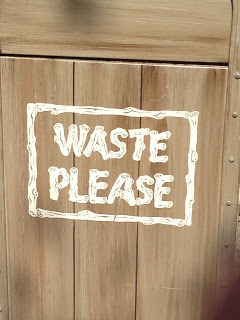
It became a chronic problem everywhere we went day . . .
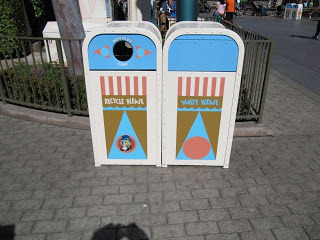
and night.
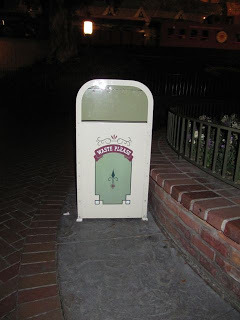
Interestingly, at least one time, Jiminy and company found a way to maintain the make a request with a verb concept and have it make sense. They totally should have done this elsewhere:

Monsters, Inc. added only into the mix, but that didn't help; the resulting phrase could have meant "Do nothing but waste," as well as "Put nothing but waste here."

Here's a case where they changed up the phrase on one can. They kept the request structure, but here (hooray!), the actual request is clear: KEEP IT CLEAN.

After seeing so many problems on trash cans, I thought that maybe the problem was solely in the rubbish division. But then I spotted this door at the Muppet theater, and I shook my head, sure someone had messed up again. Didn't they know that if something or someone is alarmed, it can mean more than one thing?

But I should have trusted that the Muppets knew what they were doing. I walked closer and noted the smaller text in the the brown rectangle:

Oh, yes! Woohoo! The person who made this sign is smart, knows their grammar, and has a killer sense of humor.
After a great trip, we flew home. But as we rode the airport shuttle to the parking lot, it happened again; I laughed at another sign. This one seemed to be an attempt to sound official, but it sounded rather silly.
In English, we often create objects by adding ee to the end of a word. For example, I've heard a tutor call the person they teach a tutee. Not a real word, but we know what it means: the recipient of the tutoring.
So what in the heck is a standee?

As is often the case in public typos, this is probably a case of over thinking it. The sign-maker people could have used the exact same number of letters by simply stating: NO STANDING.
And for the fun of it, as proof that we did Disney, here's a family photo of Splash Mountain, wherein we're inwardly freaking out but purposely looking bored.
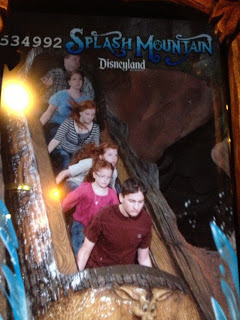
© 2012 Annette Lyon, all rights reserved
While I took plenty of pictures of the kids, I found myself snapping pictures of trash cans and other things that made me laugh. Soon my husband was in on it too. (My sickness appears to be contagious.)
Let's take a look.
The folks designing the cans for recyclables did an okay job. Note this can, with the polite request to recycle:

We could argue that they could have added a comma between the two words, making it RECYCLE, PLEASE, but at least the request makes sense.
The receptacle standing right next to this one, however, uses the same type of phrase, including please, but they ended up with an unintentional humorous meaning:

Now obviously they don't want park goers to throw things around and otherwise waste stuff. No, what they're asking is for people to put their waste in the can. But that's not necessarily what the can says. Because waste can be both a verb (don't waste your money) and a noun (garbage = waste), the two-word phrase could mean either, "Please put your waste here," or, "Please do waste the park."
The problem was compounded by the fact that its twin, the RECYCLE PLEASE can, used a verb first, making it all too easy to assume that the other can also has a verb in its almost-matching phrase. Look at the cans side by side, and you'll see what I mean.

Jiminy Cricket wasn't the only one with the problem. We found the very same issue in Frontier Land.

It became a chronic problem everywhere we went day . . .

and night.

Interestingly, at least one time, Jiminy and company found a way to maintain the make a request with a verb concept and have it make sense. They totally should have done this elsewhere:

Monsters, Inc. added only into the mix, but that didn't help; the resulting phrase could have meant "Do nothing but waste," as well as "Put nothing but waste here."

Here's a case where they changed up the phrase on one can. They kept the request structure, but here (hooray!), the actual request is clear: KEEP IT CLEAN.

After seeing so many problems on trash cans, I thought that maybe the problem was solely in the rubbish division. But then I spotted this door at the Muppet theater, and I shook my head, sure someone had messed up again. Didn't they know that if something or someone is alarmed, it can mean more than one thing?

But I should have trusted that the Muppets knew what they were doing. I walked closer and noted the smaller text in the the brown rectangle:

Oh, yes! Woohoo! The person who made this sign is smart, knows their grammar, and has a killer sense of humor.
After a great trip, we flew home. But as we rode the airport shuttle to the parking lot, it happened again; I laughed at another sign. This one seemed to be an attempt to sound official, but it sounded rather silly.
In English, we often create objects by adding ee to the end of a word. For example, I've heard a tutor call the person they teach a tutee. Not a real word, but we know what it means: the recipient of the tutoring.
So what in the heck is a standee?

As is often the case in public typos, this is probably a case of over thinking it. The sign-maker people could have used the exact same number of letters by simply stating: NO STANDING.
And for the fun of it, as proof that we did Disney, here's a family photo of Splash Mountain, wherein we're inwardly freaking out but purposely looking bored.

© 2012 Annette Lyon, all rights reserved
Published on June 12, 2013 05:00
May 29, 2013
Wix's Life Lessons for 8th Graders
As the school year winds down (and my oldest child graduates from high school!), I wanted to share a cool list made by my daughter and her classmates. For the past two years, they've been in a special advanced program for English and social studies (nicknamed "Acad," short for Academy), and this year they had the same teacher for both classes.
This teacher (nicknamed "Wix") combined the two subjects. For example, when he taught about the Civil Rights era, the class followed that unit by reading and discussing literature about race issues. He integrated both subjects seamlessly, and as a result, the students learned more in his class than any other in their lifetimes.
Wix taught my daughter how to be a critical thinker. Wix challenged her in ways few junior high kids ever are. He made her grow and stretch and do more than she thought she could.
Wix is retiring, so this is his last set of students ever. As a going-away gift, my daughter had her classmates share favorite Wix-isms, things he'd taught them. Even in a public school setting, he managed to teach them values.
My daughter typed up the Wix lessons and framed them as a parting gift from their class. Some are clearly inside jokes that I'll have to learn about sometime. Some are silly, funny, or painfully true ("I want to hug you, but I can't"). And still others are profound lessons.
Here's to another great year of school gone, a great summer ahead, and to taking the lessons we've learned with us. Thanks to Mr. Wix and so many other great teachers out there.
All We Need to Know We Learned from Wix
Forgive one another | To keep a cow from
exploding, stab it | For whatever reasons . . . | Alcohol is the stuff to drink
for those of you it hurts to think | Ask questions | Don’t wake up hibernating
bats | I’m telling you straight up |The world isn’t black and white | There are
two kinds of people in the world | There is no such thing as a stupid question
| Knowledge is not the same thing as information | Pay one extra payment on
your house yearly | Appreciate real beauty | Bugs are part of any healthy diet
| Palm trees can be dangerous | All knowledge is equal | Read your scriptures |
I love you | There is always more than one way to spell a word | Dingbat is a
language | Not all chocolate is equal | Are you ready? | Everyone is a child of
God; treat them that way | You cannot worry about the speck in your neighbor’s
eye when you have a beam in your own | Honor your parents . . . even if they
are Republicans | I want to hug you, but I can’t. | Always hug Noah | Everyone
can win in the end | Reality is a misconception fostered by the imaginary need
to feel important | Failure is good | Remember the Rondas in your life | What’s
the point of education if I can’t force you to be miserable? | I’m not reading
too fast; you’re listening too slow | The basis on which you judge others will
be the basis on which you will be judged by God | Never talk to someone in
English if they are listening in Dingbat | Love cannot be explained in words | Don’t
judge head hunters | Beauty is in the eye of the beholder | You can always lie
yourself through college | Sometimes education can get in the way of your
learning | One day the girls will notice you |You don’t want your last memory
to be Wix giving you mouth-to-mouth | Time flies like an arrow; fruit flies
like a banana | Only follow the rules that don’t matter | That which is
essential in life is invisible to the eye | The difference between intelligence
and stupidity is that intelligence has its limits | Some people are harder to
love than others, but that doesn’t mean you shouldn’t love them anyway | Step
out of your bubble | We have reached a bizarre moment in life | Love your
neighbor | Stand up for yourself | Being gifted is a gift, not a curse | Take
risks | A lie gets halfway around the world before the truth gets a chance to
put its pants on | I love you.
From Your 2012–2013 Wix Kids
We love and will miss you
© 2012 Annette Lyon, all rights reserved
This teacher (nicknamed "Wix") combined the two subjects. For example, when he taught about the Civil Rights era, the class followed that unit by reading and discussing literature about race issues. He integrated both subjects seamlessly, and as a result, the students learned more in his class than any other in their lifetimes.
Wix taught my daughter how to be a critical thinker. Wix challenged her in ways few junior high kids ever are. He made her grow and stretch and do more than she thought she could.
Wix is retiring, so this is his last set of students ever. As a going-away gift, my daughter had her classmates share favorite Wix-isms, things he'd taught them. Even in a public school setting, he managed to teach them values.
My daughter typed up the Wix lessons and framed them as a parting gift from their class. Some are clearly inside jokes that I'll have to learn about sometime. Some are silly, funny, or painfully true ("I want to hug you, but I can't"). And still others are profound lessons.
Here's to another great year of school gone, a great summer ahead, and to taking the lessons we've learned with us. Thanks to Mr. Wix and so many other great teachers out there.
All We Need to Know We Learned from Wix
Forgive one another | To keep a cow from
exploding, stab it | For whatever reasons . . . | Alcohol is the stuff to drink
for those of you it hurts to think | Ask questions | Don’t wake up hibernating
bats | I’m telling you straight up |The world isn’t black and white | There are
two kinds of people in the world | There is no such thing as a stupid question
| Knowledge is not the same thing as information | Pay one extra payment on
your house yearly | Appreciate real beauty | Bugs are part of any healthy diet
| Palm trees can be dangerous | All knowledge is equal | Read your scriptures |
I love you | There is always more than one way to spell a word | Dingbat is a
language | Not all chocolate is equal | Are you ready? | Everyone is a child of
God; treat them that way | You cannot worry about the speck in your neighbor’s
eye when you have a beam in your own | Honor your parents . . . even if they
are Republicans | I want to hug you, but I can’t. | Always hug Noah | Everyone
can win in the end | Reality is a misconception fostered by the imaginary need
to feel important | Failure is good | Remember the Rondas in your life | What’s
the point of education if I can’t force you to be miserable? | I’m not reading
too fast; you’re listening too slow | The basis on which you judge others will
be the basis on which you will be judged by God | Never talk to someone in
English if they are listening in Dingbat | Love cannot be explained in words | Don’t
judge head hunters | Beauty is in the eye of the beholder | You can always lie
yourself through college | Sometimes education can get in the way of your
learning | One day the girls will notice you |You don’t want your last memory
to be Wix giving you mouth-to-mouth | Time flies like an arrow; fruit flies
like a banana | Only follow the rules that don’t matter | That which is
essential in life is invisible to the eye | The difference between intelligence
and stupidity is that intelligence has its limits | Some people are harder to
love than others, but that doesn’t mean you shouldn’t love them anyway | Step
out of your bubble | We have reached a bizarre moment in life | Love your
neighbor | Stand up for yourself | Being gifted is a gift, not a curse | Take
risks | A lie gets halfway around the world before the truth gets a chance to
put its pants on | I love you.
From Your 2012–2013 Wix Kids
We love and will miss you
© 2012 Annette Lyon, all rights reserved
Published on May 29, 2013 21:23
May 21, 2013
10 Years and a Great Conference

Every spring for ten years now, I've been at the LDStorymakers Writers Conference, which began as a tiny event (47 attendees) in a tiny venue (a small rented theater) and which has turned into a powerhouse conference that has to be capped. This year we had 450 attendees and a waiting list. I served on the committee for something like seven years, and one year I even co-chaired it with Heather Moore. It grows and improves each year, and it's a huge undertaking. (Next year, the conference is moving to a larger venue to accommodate up to 600, I believe.)
To catch up, I've blogged about the conference several times: HERE, HERE, HERE, HERE, HERE, HERE, and HERE.
For five of those ten years, I've attended the Whitney Awards gala, two as a committee member and three times as a finalist (one of those years, I won—still one of the highlights of my career).
I look forward to the conference for many reasons. I enjoy teaching about something I'm passionate about. I love listening to other writers and learning at their feet. I love rubbing shoulders with both aspiring and highly successful writers. It's exciting to see writers grow and progress in their careers.
But as I said on Facebook the other day, it's also where, in some ways, I find my people. Because face it: writers are a weird bunch, and only fellow writers really get it.
Even when the conference is close to home, I make a point of staying at the hotel, because putting the Mom hat on and taking it off several times a day is not only exhausting for me, but difficult on the kids. They have a much easier time when they know that Mom's leaving on Thursday and coming home Saturday night (or whatever the situation is).
This year I shared a room with Heather B. Moore and Sarah M. Eden. As fun as the conference is, it's also exhausting. One night we all lay in bed in the dark, staring at the ceiling in silence. We were all wiped. That's when Sarah said, "This is the lamest slumber party ever." And it was, but we were happy about it!
This year was particularly awesome for several reasons.
One fun part was our critique group going out to dinner together (minus two members). (I'll do a post soon to explain the butter churns on our matching shirts.)

Left to right: J. Scott Savage, Michele Paige Holmes, Annette Lyon, Sarah M. .Eden, Heather B. Moore.
(Not pictured: Robison Wells and Lu Ann Staheli)
Another was hanging out with my dear friend and accountability partner, Luisa. (How did we not get a picture together?) She lives far away, so although we keep in almost daily contact, we don't see each other very often. Even at conferences, it's often waves in the hall with promises to find a time to connect. And then we never do. This year we found time in advance and penciled it in, and it happened!
The Whitney gala was a delight. Having an excuse to dress up is always fun.
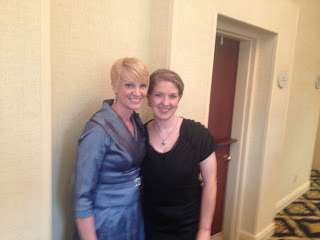
With Romance Finalist Krista Jensen
Seeing friends and colleagues is great too. And even though I didn't win (and was quite sure I wouldn't; Paige was up against some awesome books), I had a great time. This year I was part of the losers cheesecake pictures, which Janette Rallison invented.

A bunch of us finalists who didn't win, acting all upset. (Janette's face cracks me up!)
I even got to meet Ka Hancock, whose book I fell in love with. Can't wait to read what she publishes next!

With Ka Hancock, author of the finalist Dancing on Broken Glass. (READ IT.)
But the highest point of the whole weekend was our keynote speaker, Anne Perry. Friday evening she gave her keynote address, and Saturday morning she taught a 2-hour master class (which I luckily signed up for before it filled up).
Her keynote address was nothing short of inspired. I could have listened to her all night (and not just because of her lyrical voice and British accent). Her words touched my heart in a sacred place, in a way no one else has ever done. Anne Perry is a fellow Latter-day Saint and a master writer, and she drew on both of those things in her address. I was near tears the entire time. It's an experience I'll never forget. She changed me.
Saturday's class was a pure delight; she was not only witty and entertaining but deeply wise. She taught a lot of things that I knew already on some level, but that she reiterated in a way that had me nodding, reminded on a higher level about why certain things are important in writing and how crucial it is to keep working. (Truth be told, it was also nice to hear that even Anne Perry must revise and revise and revise.)
At one point on Friday, I saw her eating a meal alone at a table. I knew her seatmates would arrive shortly; she was at a table reserved for them. I wanted to go up and say hello, to tell her how I admired her as a person, how I love her work and her voice, and how reading her books has inspired me to raise the bar on my own work.
On one hand, I told myself that she's human, and that she would welcome a friendly hello. On the other, a voice screamed in my head that She's Anne Perry! You can't do that! So I chickened out. I regret that now and probably always will.
I doubt she'll ever read this, and I may never have another opportunity to tell her what her work and her words this year mean to me, but I'll never forget this conference or the influence she had on me and hundreds of others.
© 2012 Annette Lyon, all rights reserved
Published on May 21, 2013 16:09
April 10, 2013
WNW: An Excellent Issue. Single & Double Plurals.
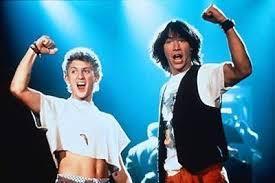
I was first introduced to Mignon Fogerty (Grammar Girl) because of this grammar issue. She appeared on Oprah to settle a viewer's complaint. (If you don't listen to the Grammar Girl podcast, subscribe already!)
Oprah and her best friend, Gayle, had gone on a road trip across the United States, and camera crews followed them. The result was several episodes of something they called "Oprah and Gayle's Road Trip."
A viewer wrote in saying that the title was incorrect; Oprah's name also needed a possessive, like so: "Oprah's and Gayle's Road Trip." She ended her note by saying she was an English teacher and therefore knew this stuff.
The viewer was brought on to tell her side, and then Oprah brought on Mignon to reveal the truth. Did the show get it right or wrong?
The show, not surprisingly, got it right. I doubt Oprah would have embarrassed her staff by bringing on a grammar expert to publicly point out a mistake.
But why was the title correct? Is there a time where making both names possessive would be correct?
First, yes, there are times when making both names possessive is correct. And there are times when it's not. It all depends on whether the ownership is joint or separate.
Let's set Oprah and Gayle aside and look at another example. Either of these sentences could be correct:
Jane and Sally’s bikes are in the garage.
Jane’s and Sally’s bikes are in the garage.
Which you choose depends on context. We need more information about the bikes before we can make the call.
If Jane and Sally have a sporting goods store they own together, and in it, they have several bikes, then we have joint possession, and we need only one apostrophe. In that case, the first example is correct, because Jane and Sally are acting as a group of ownership. Together, they own the bikes. So:
Jane and Sally’s bikes are in the garage.
But if Jane and Sally simply own different bikes (Jane’s is purple, and Sally’s is blue), we’re dealing with separate possession, so each girl needs her own apostrophe to show her ownership of her bike.
Jane’s and Sally’s bikes are in the garage.
Another example: Let’s take Tom and Joey, who are brothers. Let's talk about their parents. Because the parents belong jointly to both boys, we don’t need to make both of their names possessive. We use a single possessive to show joint ownership:
Tom and Joey’s parents go on dates every weekend.
But what if Tom and Joey are buddies rather than brothers? What if both sets of their parents happen to be friends who hang out in a larger group together on weekends? Then the whole situation changes. Now we’re talking about Tom’s parents, and we’re also talking about Joey’s parents: four different people, not two. Now we need to make both boys' names possessive.
Tom’s and Joey’s parents go to the movies every weekend.
One way to remember this is by substituting the noun (bikes, parents) for an opinion. If two people share the same opinion, then group their names together as a joint possessive:
Tom and Joey’s political views sparked controversy.
If Tom and Joey don’t agree on politics—let’s say Tom is a Democrat and Joey is a Republican—then both names need an apostrophe, because we have separate views:
Tom’s and Joey’s political arguments sparked controversy at school.
Or you can always remember the Oprah viewer who was wrong. Oprah and Gayle took their trip together. It was their joint trip. Therefore, the title of those episodes needed only one apostrophe. If they’d gone on separate trips, we’d need two.
If you're from my generation, you can just think of a favorite movie to get this one right. Bill and Ted had a shared adventure. Therefore, their movie is Bill and Ted's Excellent Adventure.
This topic and many more are new to the second edition of my grammar book. It's got more than double the word count of the original, with tons of new entries and many expanded ones to address more commonly asked questions I get. We're putting the final touches on it now.
Watch for it in May!
© 2012 Annette Lyon, all rights reserved
Published on April 10, 2013 08:00
April 4, 2013
Cover Real and More
Three announcements today, all of which I'm excited about!
First off, this Saturday (April 6) I will be signing books for the first time in six months. I'll be at the University Village Deseret Book in Orem during Ladies Night from 6 to 8 PM, signing copies of Coming Home. Signing with me is good friend and awesome novelist Sarah M. Eden. Please come!
Second, yesterday I was notified that I won Utah's Best of State medal for 2013 in Literary Arts for Fiction. I'm thrilled! Long-time readers will recognize the award, because I received it way back in 2007. To get it again, after writing totally different works, means a lot to me.
And finally, my expansion and major update to my grammar book is almost done! It'll be up for sale in both electronic and hard copy in time for the LDStorymakers conference, which is the first week of May. The word count is more than twice the original, with dozens of brand new entries and lots of expanded ones. The comma section alone is much longer, something readers have been asking for.
So: In celebration of being a month out from its release (and hey, to celebrate my award!), here's the brand new cover for the 2nd edition of There, Their, They're: A No-Tears Guide to Grammar from the Word Nerd!
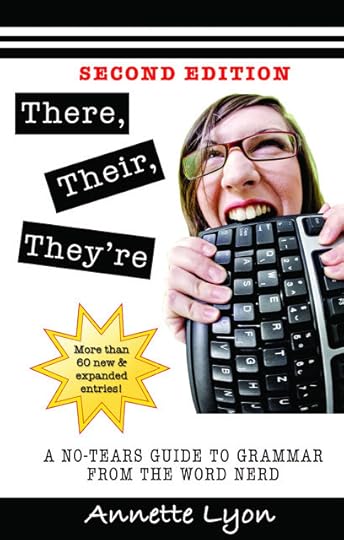
© 2012 Annette Lyon, all rights reserved
First off, this Saturday (April 6) I will be signing books for the first time in six months. I'll be at the University Village Deseret Book in Orem during Ladies Night from 6 to 8 PM, signing copies of Coming Home. Signing with me is good friend and awesome novelist Sarah M. Eden. Please come!
Second, yesterday I was notified that I won Utah's Best of State medal for 2013 in Literary Arts for Fiction. I'm thrilled! Long-time readers will recognize the award, because I received it way back in 2007. To get it again, after writing totally different works, means a lot to me.
And finally, my expansion and major update to my grammar book is almost done! It'll be up for sale in both electronic and hard copy in time for the LDStorymakers conference, which is the first week of May. The word count is more than twice the original, with dozens of brand new entries and lots of expanded ones. The comma section alone is much longer, something readers have been asking for.
So: In celebration of being a month out from its release (and hey, to celebrate my award!), here's the brand new cover for the 2nd edition of There, Their, They're: A No-Tears Guide to Grammar from the Word Nerd!

© 2012 Annette Lyon, all rights reserved
Published on April 04, 2013 10:32
March 19, 2013
I Found My Writing Home
Publishing this post scares me, because the subject is so personal. I'm going ahead with it anyway with the hope that I can get across my meaning. Deep breath.
From my first attempt at writing in second grade, I began my journey making up fantasy stories. Many long-time readers will know that those early plots were largely inspired by Beverly Cleary and her mouse Ralph, resulting in several stories involving rodents.
Even in high school, when I co-wrote an entire novel with a friend, it was a re-telling of a fairy tale (this was waaaay before doing that was cool or commonplace).
The first novel I tried my hand at by myself as an adult: also a fantasy.
So it came as a surprise to me when I began getting ideas for books with a specifically Mormon angle to them. Of course, those ideas turned into the books that got published.
I did two contemporary novels that you could call romance, and I generally do, but I've never been entirely happy with that label. Not because I don't like romance; I absolutely do, as evidenced by THIS and THIS and the fact that we're doing more of Timeless Romance Anthologies and having a ball with it. Not to mention that I went on to do historical LDS novels, and every single one of them has a romantic element.
But those first two books especially had something else in them too, something I couldn't put my finger on, but which made me hesitant to classify them strictly as romances.
So there was Lost Without You, and then At the Water's Edge (although they were written in the opposite order). Then came the four historicals: House on the Hill, At the Journey's End, Spires of Stone, and Tower of Strength. Each of my historicals, with the exception of Spires, which is a romantic comedy in spite of the serious-looking cover, had that same "other" quality.
Then I was told not to write any more historicals. And I wondered what in the world I'd do next. I'd already started researching my next one, and I had to set it aside and find something else to write about.
Enter my childhood friend Chris and her husband's deployment, which in a roundabout way led to me deciding that I had to write about what it's like to be home with a soldier gone and in the line of fire. In categorizing that book, romance never entered my mind, because, well, it's totally not. Band of Sisters is clearly women's fiction.
Some people think romance and women's fiction are the same thing, but they're not. Not even remotely. Women's fiction doesn't have a love story as the primary arc, and it deals with issues and conflicts that wouldn't normally appear in a romance. I loved writing that book, and it even took the Whitney Award in its category that year.
Yet I still thought that one day, I'd return to my fantasy roots and write books for kids. That feeling was strengthened by the fact that here in Utah, we have more successful writers of youth fiction than probably any other state in the nation. Tons of New York Times bestsellers, a Newbery honoree, and more. Youth writers here are rock stars. It's the market and genre that are most respected in these parts, likely because Utah has a lot of kids, families are serious about literacy, and we tend to like clean books, which often means youth fiction. Take this piece in the news, for example. (In case you don't click over: a launch party for Brandon Mull with Tyler Whitesides, Richard Paul Evans, Chad Morris, and Christopher Paolini. NOT KIDDING.)
Then I had a good chunk of my critique group also writing youth fiction, and this one and this one have had significant success with it (young adult and middle grade, respectively) on the national stage.
Yet I also loved mysteries, and I had a bunch of cool ideas for some. I loved romance, and could see myself writing that. I loved historicals, and would be happy doing more. And so on. What on earth should I focus on?!
My publisher couldn't/wouldn't give me direction on what they wanted next besides no more historicals even after I handed over a list of ideas and asked which they'd be most interested in.
I floundered like a boat without a rudder. I had a total and utter writer identity crisis that lasted two and a half miserable years.
The go-to advice for this kind of situation is to write the kind of book you like to read. Problem: I read all kinds of books, and I enjoy just about every genre. So that suggestion was no help.
Then one year for NaNoWriMo, I decided to write something totally wacky and weird and fun to shake myself out of the awful funk I was in. I drafted 50,000 words of a futuristic, science fiction-type young adult story. And it was a lot of fun. But contrary to my hopes going in, the experience didn't make my future writing path any clearer. (And no, that book will never see the light of day.)
Yet I knew I needed a clear path, something to sink my teeth into and identify as my own. I needed a map to plan my writing future.
I ended up deciding to write the sequel to Band of Sisters even though I had no assurance that my publisher would take it. They did (yay!), and Coming Home was released in January.
During the last year or so, a few things happened to cement my writer identity. One was researching and writing Coming Home. Another was being part of The Newport Ladies Book Club series with my novel Paige and the forthcoming Ilana.
And then during the 2012 LTUE conference, Luisa and I went out to dinner to brainstorm. She knew of my identity crisis and suggested we hash it out over food. I brought along a notebook with ideas that included young adult fantasy, historical, romance, and everything in between. We picked a story with a really cool premise, and by the time we paid our tabs, we had a rough plot sketched out.
In writing that book, which I'll begin major revisions on soon, I finally came to realize that this was the genre I belonged in. It was women's fiction. And women's fiction is my home.
I realized that my first two books were women's fiction in disguise. That was the element I could never quite wrap up tidily in the romance bow. Women's issues popped up in my historicals too.
While I was thrilled to finally latch on to my writer identity, it came with a price. Remember, I live in the land where writers of youth fiction are rock stars and are most respected by colleagues. Even my own daughter recently asked if I could please write a cool book like the fantasy we were reading together, and it broke my heart to say that I'm writing for grown-ups.
Then there are those packed, celebrity-style launch parties like the one I linked to above. It seems that most writer events for fans tends to lean more toward youth fiction as well. There was one a few years ago that included my friend Janette Rallison (who writes YA), and at the same event was Scott Westerfeld and Stephenie Meyer, among others. Really.
I've had to come to terms with the side of my ego that would like acclaim. The reality is that if I become very successful with women's fiction, it will be with limitations. In some ways, I'd like my youngest to look at me like her hero, but that can't happen if I'm not writing kids' fantasy books. Which I'm not.
Plus, youth fiction has a crossover readership from kids to grandparents, while women's fiction is read almost entirely by, well, adult women. So the numbers are different: simply put, the sales potential for youth fiction is much greater. Unless someone waves a magic wand and I become the next Jodi Piccoult, I won't be getting rich writing women's fiction. (I wouldn't mind becoming the next Kristen Hannah, though... Seriously. Her interview in Writer's Digest pretty much blew my socks off and confirmed my writer identity.)
While I'm not greedy, I am a professional, and I do rely on the money I make through my writing. Making a conscious choice to essentially limit my potential income was hard.
I also had to choose to basically walk away from earning the respect of certain peers who almost look at youth fiction as the one and only true market. Would I like my ego to be stroked a bit? Sure. Could I write youth fiction? Sure. I love the genre, and I've developed the chops over the gazillion years I've been writing to do it.
But when push comes to shove, I believe that I'm supposed to be writing women's fiction now. When I look at my list of story and research ideas, it's all women's fiction now.
I've wondered why, and why now. Why didn't I figure this out 18 years ago when I first started submitting? There may be several reasons, but I think a major one is the fact that while youth fiction isn't any easier to write than grown-up fiction (they're both hard to do well, and anyone who tells you differently is lying), in order to write good women's fiction, I simply had to be older. I had to experience more, see more of the world, encounter more situations, gain more maturity. On the other side, I've already been an adolescent. As long as I can write well and tap into that part of my brain, I could write youth fiction.
But I couldn't have written good women's fiction at 21, because back then I was barely a woman.
A bit of irony: Turns out that the old piece of advice was right after all. While I do read all kinds of books and love almost all genres, if I had to list my top books of all time, most of them are, yep, women's fiction.
© 2012 Annette Lyon, all rights reserved
From my first attempt at writing in second grade, I began my journey making up fantasy stories. Many long-time readers will know that those early plots were largely inspired by Beverly Cleary and her mouse Ralph, resulting in several stories involving rodents.
Even in high school, when I co-wrote an entire novel with a friend, it was a re-telling of a fairy tale (this was waaaay before doing that was cool or commonplace).
The first novel I tried my hand at by myself as an adult: also a fantasy.
So it came as a surprise to me when I began getting ideas for books with a specifically Mormon angle to them. Of course, those ideas turned into the books that got published.
I did two contemporary novels that you could call romance, and I generally do, but I've never been entirely happy with that label. Not because I don't like romance; I absolutely do, as evidenced by THIS and THIS and the fact that we're doing more of Timeless Romance Anthologies and having a ball with it. Not to mention that I went on to do historical LDS novels, and every single one of them has a romantic element.
But those first two books especially had something else in them too, something I couldn't put my finger on, but which made me hesitant to classify them strictly as romances.
So there was Lost Without You, and then At the Water's Edge (although they were written in the opposite order). Then came the four historicals: House on the Hill, At the Journey's End, Spires of Stone, and Tower of Strength. Each of my historicals, with the exception of Spires, which is a romantic comedy in spite of the serious-looking cover, had that same "other" quality.
Then I was told not to write any more historicals. And I wondered what in the world I'd do next. I'd already started researching my next one, and I had to set it aside and find something else to write about.
Enter my childhood friend Chris and her husband's deployment, which in a roundabout way led to me deciding that I had to write about what it's like to be home with a soldier gone and in the line of fire. In categorizing that book, romance never entered my mind, because, well, it's totally not. Band of Sisters is clearly women's fiction.
Some people think romance and women's fiction are the same thing, but they're not. Not even remotely. Women's fiction doesn't have a love story as the primary arc, and it deals with issues and conflicts that wouldn't normally appear in a romance. I loved writing that book, and it even took the Whitney Award in its category that year.
Yet I still thought that one day, I'd return to my fantasy roots and write books for kids. That feeling was strengthened by the fact that here in Utah, we have more successful writers of youth fiction than probably any other state in the nation. Tons of New York Times bestsellers, a Newbery honoree, and more. Youth writers here are rock stars. It's the market and genre that are most respected in these parts, likely because Utah has a lot of kids, families are serious about literacy, and we tend to like clean books, which often means youth fiction. Take this piece in the news, for example. (In case you don't click over: a launch party for Brandon Mull with Tyler Whitesides, Richard Paul Evans, Chad Morris, and Christopher Paolini. NOT KIDDING.)
Then I had a good chunk of my critique group also writing youth fiction, and this one and this one have had significant success with it (young adult and middle grade, respectively) on the national stage.
Yet I also loved mysteries, and I had a bunch of cool ideas for some. I loved romance, and could see myself writing that. I loved historicals, and would be happy doing more. And so on. What on earth should I focus on?!
My publisher couldn't/wouldn't give me direction on what they wanted next besides no more historicals even after I handed over a list of ideas and asked which they'd be most interested in.
I floundered like a boat without a rudder. I had a total and utter writer identity crisis that lasted two and a half miserable years.
The go-to advice for this kind of situation is to write the kind of book you like to read. Problem: I read all kinds of books, and I enjoy just about every genre. So that suggestion was no help.
Then one year for NaNoWriMo, I decided to write something totally wacky and weird and fun to shake myself out of the awful funk I was in. I drafted 50,000 words of a futuristic, science fiction-type young adult story. And it was a lot of fun. But contrary to my hopes going in, the experience didn't make my future writing path any clearer. (And no, that book will never see the light of day.)
Yet I knew I needed a clear path, something to sink my teeth into and identify as my own. I needed a map to plan my writing future.
I ended up deciding to write the sequel to Band of Sisters even though I had no assurance that my publisher would take it. They did (yay!), and Coming Home was released in January.
During the last year or so, a few things happened to cement my writer identity. One was researching and writing Coming Home. Another was being part of The Newport Ladies Book Club series with my novel Paige and the forthcoming Ilana.
And then during the 2012 LTUE conference, Luisa and I went out to dinner to brainstorm. She knew of my identity crisis and suggested we hash it out over food. I brought along a notebook with ideas that included young adult fantasy, historical, romance, and everything in between. We picked a story with a really cool premise, and by the time we paid our tabs, we had a rough plot sketched out.
In writing that book, which I'll begin major revisions on soon, I finally came to realize that this was the genre I belonged in. It was women's fiction. And women's fiction is my home.
I realized that my first two books were women's fiction in disguise. That was the element I could never quite wrap up tidily in the romance bow. Women's issues popped up in my historicals too.
While I was thrilled to finally latch on to my writer identity, it came with a price. Remember, I live in the land where writers of youth fiction are rock stars and are most respected by colleagues. Even my own daughter recently asked if I could please write a cool book like the fantasy we were reading together, and it broke my heart to say that I'm writing for grown-ups.
Then there are those packed, celebrity-style launch parties like the one I linked to above. It seems that most writer events for fans tends to lean more toward youth fiction as well. There was one a few years ago that included my friend Janette Rallison (who writes YA), and at the same event was Scott Westerfeld and Stephenie Meyer, among others. Really.
I've had to come to terms with the side of my ego that would like acclaim. The reality is that if I become very successful with women's fiction, it will be with limitations. In some ways, I'd like my youngest to look at me like her hero, but that can't happen if I'm not writing kids' fantasy books. Which I'm not.
Plus, youth fiction has a crossover readership from kids to grandparents, while women's fiction is read almost entirely by, well, adult women. So the numbers are different: simply put, the sales potential for youth fiction is much greater. Unless someone waves a magic wand and I become the next Jodi Piccoult, I won't be getting rich writing women's fiction. (I wouldn't mind becoming the next Kristen Hannah, though... Seriously. Her interview in Writer's Digest pretty much blew my socks off and confirmed my writer identity.)
While I'm not greedy, I am a professional, and I do rely on the money I make through my writing. Making a conscious choice to essentially limit my potential income was hard.
I also had to choose to basically walk away from earning the respect of certain peers who almost look at youth fiction as the one and only true market. Would I like my ego to be stroked a bit? Sure. Could I write youth fiction? Sure. I love the genre, and I've developed the chops over the gazillion years I've been writing to do it.
But when push comes to shove, I believe that I'm supposed to be writing women's fiction now. When I look at my list of story and research ideas, it's all women's fiction now.
I've wondered why, and why now. Why didn't I figure this out 18 years ago when I first started submitting? There may be several reasons, but I think a major one is the fact that while youth fiction isn't any easier to write than grown-up fiction (they're both hard to do well, and anyone who tells you differently is lying), in order to write good women's fiction, I simply had to be older. I had to experience more, see more of the world, encounter more situations, gain more maturity. On the other side, I've already been an adolescent. As long as I can write well and tap into that part of my brain, I could write youth fiction.
But I couldn't have written good women's fiction at 21, because back then I was barely a woman.
A bit of irony: Turns out that the old piece of advice was right after all. While I do read all kinds of books and love almost all genres, if I had to list my top books of all time, most of them are, yep, women's fiction.
© 2012 Annette Lyon, all rights reserved
Published on March 19, 2013 12:14
March 6, 2013
WNW: Hypercorrection
On our last Word Nerd Wednesday, we talked about how Utahns say mountain and how some people over overboard in trying to be "right" (note the sneer quotes) by pronouncing the T. When my friend Jordan McCollum, who is as big a word nerd as I am (only more qualified, because she's got a degree in linguistics), commented in that post about hypercorrection, I knew I wanted her to elaborate on the topic and share it with my readers.
Don't know what hypercorrection is? Don't think you're guilty of it? Maybe, maybe not. It's worth knowing about. Read on!
Hypercorrection: If talking like this is wrong, I don't want to be right
Guest post by Jordan McCollum
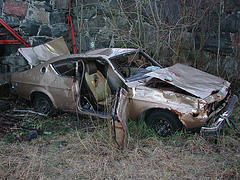
Have you ever drifted out of your lane while driving? I know I have. The natural tendency is to quickly correct your course by pulling the wheel back the opposite way. But sometimes, a drifting driver jerks the wheel back in the right direction too much. The over-correction succeeds, but the vehicle shoots into the wrong lane or the car rolls.
The same thing happens in language. (Okay, with fewer fatalities.) Most people want to speak "correctly." But did you know there might be such a thing as "too right"? I'm sure we've all had an English teacher or other "friend" who corrects casual speech with prescriptivist usage and pronunciation.
Fortunately, sometimes, those friends are so right, they're wrong. (But not dead. Whew!)
Hypercorrection
Hypercorrection is the linguistic term for being "too right." Usually, hypercorrection comes about because the speaker knows the "rules" of the language, in pronunciation, usage, or grammar, but applies them in more situations than they should (hence clip at right).
Hypercorrection is a very common phenomenon. In fact, it's part of learning a language, too. If you've ever heard a small child suddenly start saying "goed" instead of "went," it's a form of hypercorrection. They're learning that you form the past tense by adding the -ed sound, and applying it in situations where you actually don't follow that rule.
Hypercorrection in pronunciation
A couple weeks ago, Annette blogged about how people pronounce "mountain." People see the T and believe that they pronounce it like you'd say a T in isolation, or at the beginning of a word. However, the American pronunciation of "mountain" uses a glottal stop instead of a "tuh" (and those are just two of the six ways T is pronounced in English words!).
Mountain isn't the only word that uses a glottal stop for a T. Most speakers of American English, in natural speech, will pronounce the first T in important as a glottal stop. (It shows up all over the place in lots of other varieties of English too, so no knocking on Americans.)
However, some American English speakers see the "T" and think the "correct" pronunciation must feature a hard "tuh" sound like you'd hear from a T at the beginning of a word (or in British English). But T is virtually never pronounced as "tuh" in the middle of a word in American English—we rely on four of the other "allophones" of T in the middle of words, and the glottal stop is just as valid a rendition of T as the "tuh." So when you stick a "tuh" in the middle of "important," you start to sound a little . . . well, self-importuhant.
Phonologically speaking, this pronunciation is unnatural in all varieties of English (because in British English there's no 'r' there).
Another great example of hypercorrection is found in this clip from My Fair Lady, where Professor Higgins is trying to teach Eliza Doolittle to stop her dropping her H's at the beginning of words:
The "hever" is exactly the same principle—applying a correct rule (add an 'h' to the beginning of words that you pronounce as starting with a vowel) to an incorrect situation (a word that really does start with a vowel). Funnily enough, this same principle has changed the pronunciation of the name of the letter "h" in some varieties of English to "haitch." This is also influenced by the perception of h-dropping accents like Cockney as lower in prestige.
Another place I see this is when actors who speak a variety of British English get an American role. In many accents of British English, an R at the end of the syllable isn't pronounced, but in most varieties of American English, it is. So sometimes an actorrr tries a little too harrrd to stick those R's in therrre, verging on another popular dialect, Pirate English. Yarrr. (But yay for trying!)

Hypercorrection in grammar
The same principle applies to grammar (maybe even more so). For example, most speakers of English are taught from a young age that you shouldn't say "me" in subject position: Never "me and you went to the store." (Don't you just cringe?!) Always "You and I gave her the gift." But when we move the "me" into another position in a sentence, things get a little trickier: "She gave the gift back to you and I."
If you're not cringing again, here's a hint: it's "me" there. She gave the gift back to me / She gave the gift back to you and me. (Or if you're really having trouble, "She gave the gift back to us"!)
Eventually, some people try so hard to speak "correctly" that they end up talking like this:
I—just—I—oh, where to begin?
We all want to talk correctly. But keep in mind that hypercorrection isn't "extra right." It's actually wrong.
What do you think? What are your favorite examples of hypercorrection? How do you see good grammar principles go bad?
Photo credits: wrecked car—Niels Heidenreich; pirate—Kate Haskell

An award-winning author, Jordan McCollum blogs about writing craft and the writing life at JordanMcCollum.com.
She holds a degree in American Studies and Linguistics from Brigham
Young University and now makes her home in Utah with her husband and
three children. Catch up with her writing links, word nerdiness and
crazy life on Twitter, @JordanMcCollum.
© 2012 Annette Lyon, all rights reserved
Don't know what hypercorrection is? Don't think you're guilty of it? Maybe, maybe not. It's worth knowing about. Read on!
Hypercorrection: If talking like this is wrong, I don't want to be right
Guest post by Jordan McCollum

Have you ever drifted out of your lane while driving? I know I have. The natural tendency is to quickly correct your course by pulling the wheel back the opposite way. But sometimes, a drifting driver jerks the wheel back in the right direction too much. The over-correction succeeds, but the vehicle shoots into the wrong lane or the car rolls.
The same thing happens in language. (Okay, with fewer fatalities.) Most people want to speak "correctly." But did you know there might be such a thing as "too right"? I'm sure we've all had an English teacher or other "friend" who corrects casual speech with prescriptivist usage and pronunciation.
Fortunately, sometimes, those friends are so right, they're wrong. (But not dead. Whew!)
Hypercorrection
Hypercorrection is the linguistic term for being "too right." Usually, hypercorrection comes about because the speaker knows the "rules" of the language, in pronunciation, usage, or grammar, but applies them in more situations than they should (hence clip at right).
Hypercorrection is a very common phenomenon. In fact, it's part of learning a language, too. If you've ever heard a small child suddenly start saying "goed" instead of "went," it's a form of hypercorrection. They're learning that you form the past tense by adding the -ed sound, and applying it in situations where you actually don't follow that rule.
Hypercorrection in pronunciation
A couple weeks ago, Annette blogged about how people pronounce "mountain." People see the T and believe that they pronounce it like you'd say a T in isolation, or at the beginning of a word. However, the American pronunciation of "mountain" uses a glottal stop instead of a "tuh" (and those are just two of the six ways T is pronounced in English words!).
Mountain isn't the only word that uses a glottal stop for a T. Most speakers of American English, in natural speech, will pronounce the first T in important as a glottal stop. (It shows up all over the place in lots of other varieties of English too, so no knocking on Americans.)
However, some American English speakers see the "T" and think the "correct" pronunciation must feature a hard "tuh" sound like you'd hear from a T at the beginning of a word (or in British English). But T is virtually never pronounced as "tuh" in the middle of a word in American English—we rely on four of the other "allophones" of T in the middle of words, and the glottal stop is just as valid a rendition of T as the "tuh." So when you stick a "tuh" in the middle of "important," you start to sound a little . . . well, self-importuhant.
Phonologically speaking, this pronunciation is unnatural in all varieties of English (because in British English there's no 'r' there).
Another great example of hypercorrection is found in this clip from My Fair Lady, where Professor Higgins is trying to teach Eliza Doolittle to stop her dropping her H's at the beginning of words:
The "hever" is exactly the same principle—applying a correct rule (add an 'h' to the beginning of words that you pronounce as starting with a vowel) to an incorrect situation (a word that really does start with a vowel). Funnily enough, this same principle has changed the pronunciation of the name of the letter "h" in some varieties of English to "haitch." This is also influenced by the perception of h-dropping accents like Cockney as lower in prestige.
Another place I see this is when actors who speak a variety of British English get an American role. In many accents of British English, an R at the end of the syllable isn't pronounced, but in most varieties of American English, it is. So sometimes an actorrr tries a little too harrrd to stick those R's in therrre, verging on another popular dialect, Pirate English. Yarrr. (But yay for trying!)

Hypercorrection in grammar
The same principle applies to grammar (maybe even more so). For example, most speakers of English are taught from a young age that you shouldn't say "me" in subject position: Never "me and you went to the store." (Don't you just cringe?!) Always "You and I gave her the gift." But when we move the "me" into another position in a sentence, things get a little trickier: "She gave the gift back to you and I."
If you're not cringing again, here's a hint: it's "me" there. She gave the gift back to me / She gave the gift back to you and me. (Or if you're really having trouble, "She gave the gift back to us"!)
Eventually, some people try so hard to speak "correctly" that they end up talking like this:
For our one year anniversary, my girlfriend caused myself to go to a Yankees game, with whomever amongst our friends can go. But, the Weather Channel just changed their forecast and the skies are grey, so we might go with the girl that lives next door to see the movie, "Iron Man 2".
I—just—I—oh, where to begin?
We all want to talk correctly. But keep in mind that hypercorrection isn't "extra right." It's actually wrong.
What do you think? What are your favorite examples of hypercorrection? How do you see good grammar principles go bad?
Photo credits: wrecked car—Niels Heidenreich; pirate—Kate Haskell

An award-winning author, Jordan McCollum blogs about writing craft and the writing life at JordanMcCollum.com.
She holds a degree in American Studies and Linguistics from Brigham
Young University and now makes her home in Utah with her husband and
three children. Catch up with her writing links, word nerdiness and
crazy life on Twitter, @JordanMcCollum.
© 2012 Annette Lyon, all rights reserved
Published on March 06, 2013 03:00



